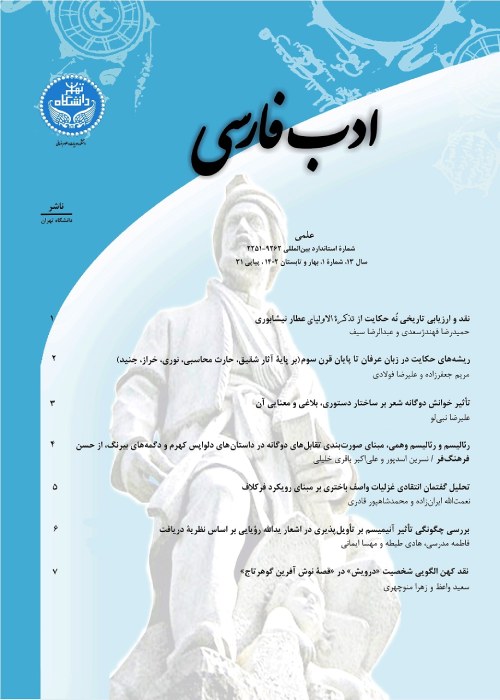Examining an Account of a Qaṣīdah by Athir al-Din Akhsikati in the Corrected Texts and Unraveling the Meaning of its Difficult Verses
Writing according to his extensive knowledge in poetry and insisting on the difficulty, complexity, and ambiguity, Athir al-Din culminated the meaning of verses. Athir al-Din, whose qaṣīdah (ode) verses have been introduced in some poetic memoirs as an instance of difficult verses of poetry, is considered one of the most prominent qaṣīdah (ode) poets of the sixth century. Owing to this poet’s position in the canon of Persian literature, contemporary scholars have paid special attention to textual criticism of his diwan; therefore, his poetry collection has textually been criticized triple in the present century. The first correction was made by Rokn al-Din Homayoun Farrokh between 1957 and 1958 in the form of 6537 verses; The second correction was made by Mahmoud Barati Khansari in 2019 in 12,000 verses. The third correction was the Ph.D. dissertation of Professor Abbas Mahyar, published in 2020 and a few years after his demise. Examination of the corrected texts and manuscripts of this poet's diwan shows that there are shortcomings in the writing of the manuscripts and the account of the criticisms so that it can be claimed there is a long way to go before reaching a revised text from the diwan. To prove this claim, in this research, by descriptive-analytical method, difficult verses of a poem by Athir al-Din will be examined based on the account of corrected texts, and their comparison with the writing of ancient manuscripts. Many of the versions cited in this study are the same as those that were available to the textual critics, but they did not use the necessary care in selecting or reading words, combinations, and interpretations. The research findings display that among the three corrections made, the correction of the late Mahyar is better than the other two since he has chosen an eclectic method of correction and the other two correctors have worked according to the base version. From a textual criticism perspective, according to the existing versions of Athir al-Din's Diwan, it seems that using the "base version" method in criticizing cannot have the necessary efficiency. Further, to criticize this poet's diwan textually, while grasping his mentality, language, and scope of knowledge, one should use other knowledge in the field of literature such as lexicography, stylistics, and criticism.
- حق عضویت دریافتی صرف حمایت از نشریات عضو و نگهداری، تکمیل و توسعه مگیران میشود.
- پرداخت حق اشتراک و دانلود مقالات اجازه بازنشر آن در سایر رسانههای چاپی و دیجیتال را به کاربر نمیدهد.


